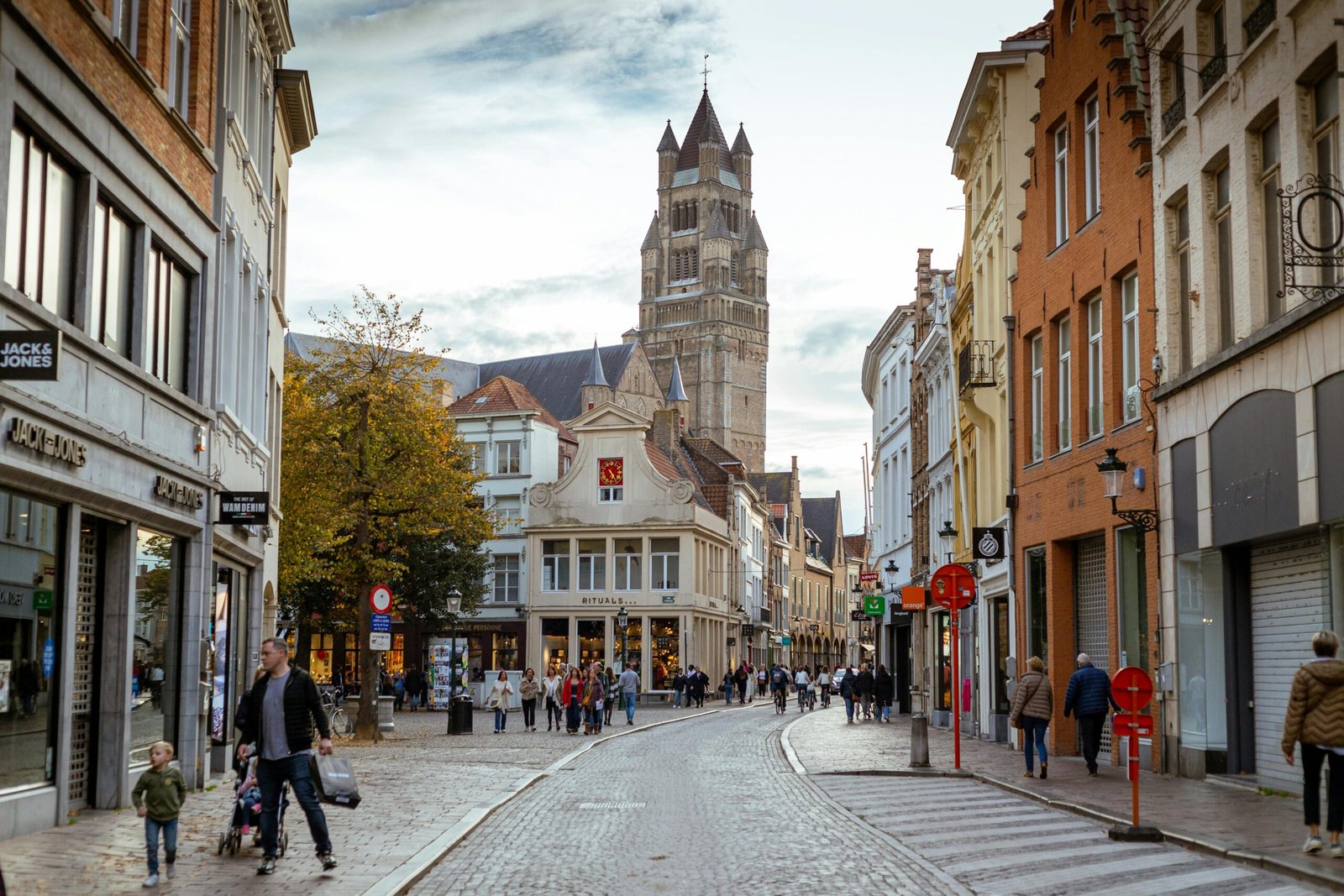Discover the experiences of 11 American journalism students during a 3-week RIAS Berlin Commission fellowship across Germany. From Berlin to Hamburg, they share unique insights into journalism training, cultural exchange, and building connections with their German peers.
The project is supported by the Transatlantic Program of the Federal Republic of Germany, funded by the European Recovery Program (ERP) of the Federal Ministry for Economic Affairs and Energy (BMWE)
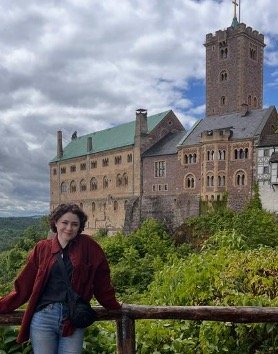
Katie Hallum, University of Oklahoma, Norman, Oklahoma
Shoved into the cramped and unbearably warm U-12 train, I’m dabbing at the sweat rolling down my brow when a younger man points to my suitcase and asks where I’m coming from. “The United States,” I answer with a wince. “I’m a journalist.” He beams. “How important,” he replies. His reaction to my profession isn’t strange here in Germany, a fact I find hard to wrap my head around as we travel across the eastern side of the country. Even harder for me to grasp is the trepidation in fellow journalists and students’ eyes as my cohort details how we face attacks from our community and the current administration. It’s unfathomable here in Germany, a place. where journalism is still considered a pillar of democracy and is protected. But there is tension brewing between the East and the West, a fact we’re consistently made aware of as we travel between storybook-esque towns with Soviet Union-era buildings surrounding their perimeter. The history behind this tension is palpable and, more importantly, inescapable here in Germany. Here, they want the transgressions of the past to be known. That much is obvious from the multitude of museums, memorials and monuments we visit that scream: actions have consequences. It’s a lesson Germany wants to remind its citizens of to protect the democracy they’ve carefully cultivated—and it’s a lesson for us back in the United States. Thank you, RIAS for this carefully cultivated reminder.

Sophia Hammer, University of Arizona, Tucson, Arizona
The difference between my experiences in Germany and what I came home to has stayed with me. I returned to the US in the middle of political unrest. The protests in Los Angeles, sparked by ICE raids and debates about the rule of law, civil rights and press freedom, have been (and still are) intensifying. While in Germany, I visited several historical sites that carry the heavy weight of the country’s past: the East Side Gallery, Berlin-Hohenschönhausen Memorial, Sachsenhausen and the Memorial to the Murdered Jews of Europe. Every part of the history and places we visited was about remembering, but more importantly recommitment to the value of democracy and the very real cost of its absence. The Trump administration’s attacks on press freedom, use of the National Guard on civilians, efforts to expand deportations and disregard for the judicial system in the U.S. show just how fragile democratic institutions can be and the need for remembrance and commitment. My time in Germany made me contemplate what it looks like when a society treats the preservation of democracy as a shared responsibility. Upholding press freedom is part of that responsibility, but just as important is how we as journalists choose to tell others’ stories. I enjoyed our visits to ARD, the Museum for Communication, and the ECMPF because of their dedication to these responsibilities. I would also like to sincerely thank the students at each university we visited. Our conversations were always my favorite. Time with all the students we met was truly inspiring and filled me with hope for the future of storytelling
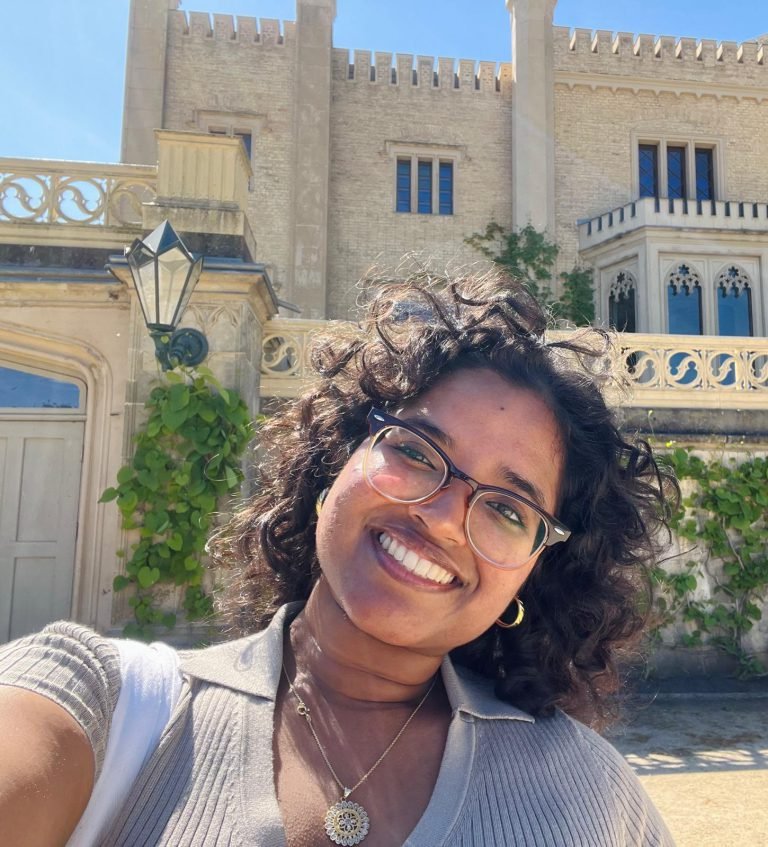
Jerin Tasnim, Stony Brook University, Stony Brook, New York
The RIAS Berlin Commission presented a unique opportunity to delve into the complexities of the past and understand how it has shaped modern Germany. During our visit, we recognized the events that had occurred and got to experience both the physical and emotional remnants—both positive and negative—of history. For instance, witnessing the Frauenkirche in Dresden was breath-taking and knowing how it was reconstructed with the old and mixed in with the new, created a powerful message, that even after all the destruction it has faced it is still standing as a symbol of remembrance, resilience and change. Moreover, we got to meet with several experienced individuals as well who were once part of the program. To hear their paths and how they came to be where they are today was inspiring and gave me an outlook I haven’t had before. Not only that, but we also got to converse and interact with fellow students of various journalism fields, and I must say those were some of the best highlights of this program- some of the topics discussed made us realize that we see similar patterns between Germany and the States, concluding that we face quite similar challenges even across different nations. In general, creating those connections between people around our age was valuable, as we all know- journalism is a closer world than what many people may think. We also met several people whose stories left a lasting impression on us. One was a former political prisoner in East German Stasi prison and another was a Syrian refugee, both shared their intense stories and their escape from their circumstances. These narratives were impactful and served as a powerful reminder of the importance of journalism. They highlight the need for stories like these to be known and for injustices occurring around the world to be brought to light. Overall, as much fun and amazing as it was to explore parts of Germany, this experience served as a powerful reminder of our responsibilities as journalists. We are committed to upholding the core values of public service, ensuring that people are seen and their stories are told. Our goal is to inform the public, enable informed decisions, and connect people worldwide.
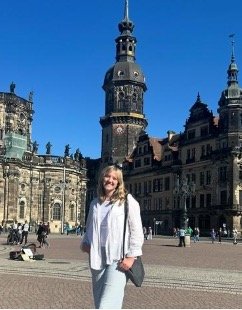
Carly Gist, Southern Illinois University, Carbondale, Illinois
Losing sleep, making friends. When a group of journalism students at a university in Hamburg filmed my peers for a TikTok, asking them what headline they would choose to describe this trip, that’s what came to my mind. I returned to the U.S. last night. Our program ended about a week ago, and I decided to take some time exploring Europe before heading home. After three weeks in Germany, I think I mastered the art of public transport. Throughout the RIAS student program, we learned so much about the history of Germany, WWII, the Cold War, and the role journalism played and continues to play. Some highlights included visiting the Tempelhof Airport, meeting a former Stasi prisoner, and exploring the Museum of Communication. We had thoughtful discussions with journalists and political leaders. But throughout these meetings and tours, concerns about the field of journalism in both the U.S. and Germany kept coming up. We discussed sensationalism, fake news, biases, censorship and the rise of AI until we were blue in the face. Oftentimes, we’d get asked if we still wanted to be journalists after learning all that. And every time, our answer was yes. If anything, this trip made me want to stay in the field more than ever. Although it hasn’t been seamless, Germany works to not shy away from its past. It memorializes the holocaust and reflects on its role in the wars. But in order to do that, history had to be recorded. There’s a saying that journalism is the first rough draft of history. If we want to continue learning from history, we have to continue recording it. By the time the program was over, I was exhausted and my feet were killing me, but I left with new friends and new knowledge. I’ve brought home ideas to implement in my school’s newspaper and a passion for journalism that only seems to keep growing. I could never express how grateful I am to have received this opportunity. It was truly an experience I’ll never forget. Thank you, RIAS, for everything. I can’t wait to stay involved with the organization and watch it continue to grow.
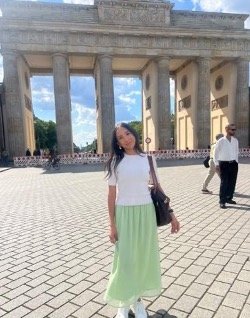
Daniela Cazares, University of Arizona, Tucson, Arizona
I cannot be more grateful for my time spent in Germany with the RIAS ERP Student Program. From the first few days to my last, I learned something new every single day. This experience not only deepened my understanding of journalism on an international level but also gave me a richer appreciation for the cultural and political context of Germany. I really enjoyed visiting media outlets like Deutschlandfunk Hauptstadtstudio and Deutsche Welle Arabic. These visits gave me a unique perspective on how different the media landscape is in Germany and sparked great conversations about how American journalists pitch international stories to their newsrooms. Hearing directly from journalists like Jaafar Abdul Karim at DW, helped me think more critically about the global reach and responsibility of reporting.When it came to politics, being inside the Bundestag was one of my favorite parts of the trip. Learning about Germany’s political system and the ways it differs from ours in the U.S. gave me new insight into how democracy is interpreted and implemented in other parts of the world. I also appreciated our discussions with German students on transatlantic affairs. Hearing how they view U.S. media coverage and global issues helped me reflect on our role as storytellers. I’m especially thankful for the speakers and guests that RIAS included in the program. Peter Keup’s tour, told through his own lived experience, was also very powerful to me. I also had the chance to meet Kate Brady from The Washington Post, she left me feeling even more inspired to pursue meaningful international coverage in my own career. This trip gave me an abundance of knowledge on culture, politics, and history, and I cannot thank RIAS enough. To Chris, Pam, and Christina—thank you for everything. I hope to stay connected with the program and continue learning from the experiences and relationships I built during this unforgettable journey.
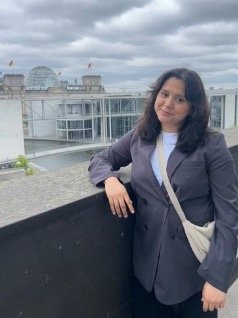
Nayeli Jaramillo, University of North Carolina, Chapel Hill, North Carolina
The three weeks I spent with the RIAS Berlin student program impacted me personally and professionally. I appreciated having honest political and cultural conversations with German students, journalists, and politicians from different backgrounds. It was fascinating to realize how something that feels completely normal in the U.S. — like being able to look up someone’s phone number or home address — was shocking to others, and vice versa. These exchanges pushed me to think more critically about privacy, ethics, and how culture shapes how we cover and consume news. They also gave me the confidence to cover stories from a broader, more international perspective. I was surprised, and in some ways comforted, to see that journalists in Germany face many of the same challenges we do: engaging audiences with short attention spans and covering all sides of a story without unintentionally platforming harmful or false ideas. We also discussed the rise of the far-right AfD party, and I learned just how difficult it can be to cover politics responsibly. AI came up often in our discussions. There were mixed opinions on how it should be used in journalism. I walked away convinced that we need clear, shared standards, especially around transparency, especially because mistrust in the media is high. As someone who loves history documentaries, visiting Tempelhof Airport and the Berlin Wall Memorial felt like stepping into one. It was also surreal to visit rural towns in eastern Germany and where Martin Luther lived, after hearing so much about them in my European history courses. One of my favorite experiences was touring the Stasi prison with Peter Keup, who was held there for 10 months. I am incredibly grateful for this experience. It gave me fresh ideas, new perspectives, and a deeper appreciation for the role journalists play in connecting people across borders.
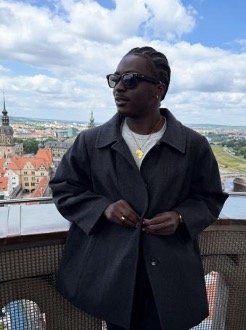
Ben Kwadu, University of Central Oklahoma, Edmond, Oklahoma
My experience with the RIAS Berlin Commission was nothing short of phenomenal. Seeing their journalistic and political landscape was truly eye-opening, especially how relevant newspapers and radio stations still are compared to those in the U.S. Getting an in-depth look at how they tackle current issues in journalism was refreshing, mainly because they seem to take reporting more seriously than many journalists in America. Some might even say they take it too seriously, as they shared how challenging it can be to report more positive news given the present circumstances, not just in their country, but globally. My favorite part of the program had to be the historical aspect of everything. Learning the origins of RIAS and visiting landmarks, monuments, and museums was just amazing. I especially loved learning about Tempelhof Airport and its role in World War II and the Cold War. The fact that it still isn’t completely finished being built astonishes me. As we toured more of East Germany, the differences compared to the western part were still very noticeable. Many of the German students we met hadn’t even visited those cities themselves. Although some of their opinions were somewhat critical, I found places like Dresden and Eisenach to be some of the most beautiful I’ve ever seen. Visiting different universities and talking to fellow aspiring journalists was a highlight. Hearing their diverse perspectives was inspiring. Everyone we met along the way was so lovely and left us with great memories—shout-out to Hellen in Potsdam, one of my favorite tour guides. Making transatlantic connections was such a fun and meaningful experience. I feel truly blessed to have had the chance to go and experience Germany. I can even say now to my friends that I have some German in me, mainly from all the German dishes I loved.
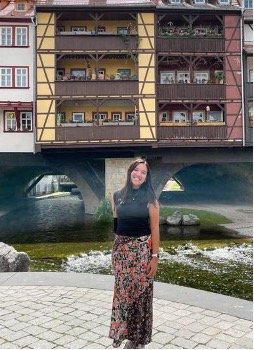
Abigail Watts, University of Georgia, Athens, Georgia
During the RIAS ERP Student Program, I had the opportunity to explore the value of a free press and fair reporting through conversations with German journalists, students, and media professionals. While visiting universities across Germany, I engaged with students studying journalism, politics, and international relations. These conversations revealed both shared challenges and unique differences in how we approach the news and cover politics in our respective countries. We had the opportunity to visit and learn about the Bundespressekonferenz, a space where journalists regularly question German government officials. We also toured major news outlets where we learned about German journalists’ reporting processes and how they are adapting to a rapidly changing media landscape. In our discussions, we talked about the importance of journalists having the ability to safely and diligently cover political topics. By tracing the history of RIAS as an outside source of news to East Berlin during the Cold War, we saw how journalism can spread information and counter propaganda. Germany’s historical context reinforced the critical role of free and fair press in any democracy. Germany has experienced several different types of government throughout its history, therefore it was fascinating to examine the role that the media played in the politics of each period. For me, the most impactful part of the RIAS program was hearing firsthand accounts of history from incredible people like Peter Kaup, who spent 10 months in a Stasi prison, and Kani Alavi, who witnessed the fall of the Berlin Wall. I left the program with a deeper appreciation for the responsibilities that come with press freedom and a broadened perspective on journalism’s global role.
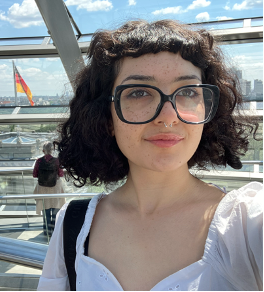
Sophia da Silva, University of Maryland, College Park, Maryland
Before this program, like many Americans, my knowledge of German history and politics was embarrassingly sparse. Throughout the course of these three weeks I’ve become enlightened to the past and present of this country especially in the ways that Germany remains politically divided even 30 years after the fall of the Berlin wall. A highlight of our trip was getting to talk about this division and the similarities from the U.S. to Germany at the Frauenkirche. A beautiful cathedral destroyed in WWII and completely rebuilt during German reunification now stands as an icon of Dresden and of these different eras of German history. Even as someone who isn’t particularly religious the church was very calming and provided a very welcoming and meditative space to the political discussion we had in a way I didn’t expect. During the trip we went to several appointments that had very similar concerns and questions about U.S. politics which allowed us to hear different perspectives and further develop our own understanding and opinions, but the discussion at the Frauenkirche felt the most productive. The other appointment that really resonated with me was our tour of a Stasi prison with former prisoner Peter Keup. As someone who was a firsthand witness of this part of history Peter provided such an intimate and immersive experience that I can’t imagine any other way. It’s one thing to read about history, but it carries such a different weight to learn from someone who experienced it firsthand, to see a human being in front of you and realize all the things he’s telling you about are things he experienced firsthand. What really stuck with me was the ways he’d talk about how the prison would try to break and disorient its prisoners and then about the crumbs of human interaction that prisoners would try to get with one another. Peter is such an intelligent and kind person, even just getting to meet him was a highlight of the trip. This program introduced me to so many wonderful, intelligent people, I made personal and professional connections that last a lifetime.
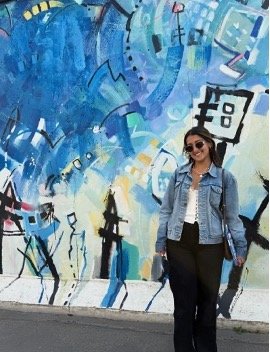
Lola Murti, University of Georgia, Athens, Georgia
Participating in the RIAS Berlin student program was an unforgettable experience. Over three weeks, I got to meet with journalists, policymakers and media experts across East Germany. Throughout the program, I gained a deeper understanding of how the country navigates politics, media and its complex history. One meeting that I found particularly moving was hearing from Peter Keup, a former political prisoner who gave us a guided tour of a Stasi prison. His story was powerful, and a reminder of why access to information and freedom of movement matter so much. As a journalist, it helped me reflect on the privilege and responsibility that come with telling stories. I also really enjoyed meeting students at universities across Germany, as well as connecting with the other U.S.-based journalists in the program. Everyone brought different experiences and perspectives, and the conversations we had in meetings, on trains, and during dinners made the whole program even more meaningful. As students just starting out in journalism, it was reassuring to see how much common ground we shared and how committed everyone was to telling the stories that matter. I left the program with a fresh perspective on global journalism, and a new group of friends and colleagues that I really admire. I’m extremely grateful to have been part of it.
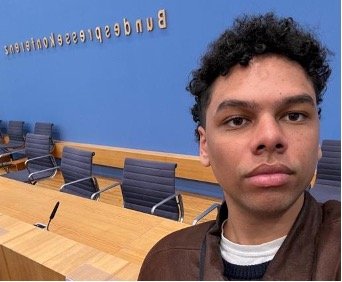
Canyon Mizera, Folsom Lake College, Folsom, California
My time with the RIAS Commission student exchange program was great overall. From my understanding, RIAS was based in Berlin which is why it was essential to experience the history related to the Cold War. Berlin was filled with culture that I had never seen before as well as people who had experienced control under the Soviet Union. This was also apparent during our time spent in parts of East Germany, including Saxony and Thuringia. Experiencing these parts of Germany was essential to our program. It gave us insight into how conditions were during the Cold War. Being in towns like Dresden and Erfurt showed a contrast between heavy military operations and the opposite. Erfurt retained a significant amount of culture and historical architecture that has since been renovated to preserve that history. Going to Hamburg was also a very important moment in the program. It separates what culture is like in the East, West, and Berlin. Going to college classes regarding journalism was very interactive and I felt like it was fun to know how other students are learning journalisms. I also think the dinner with journalists was also one of the best learning experiences for me personally.
